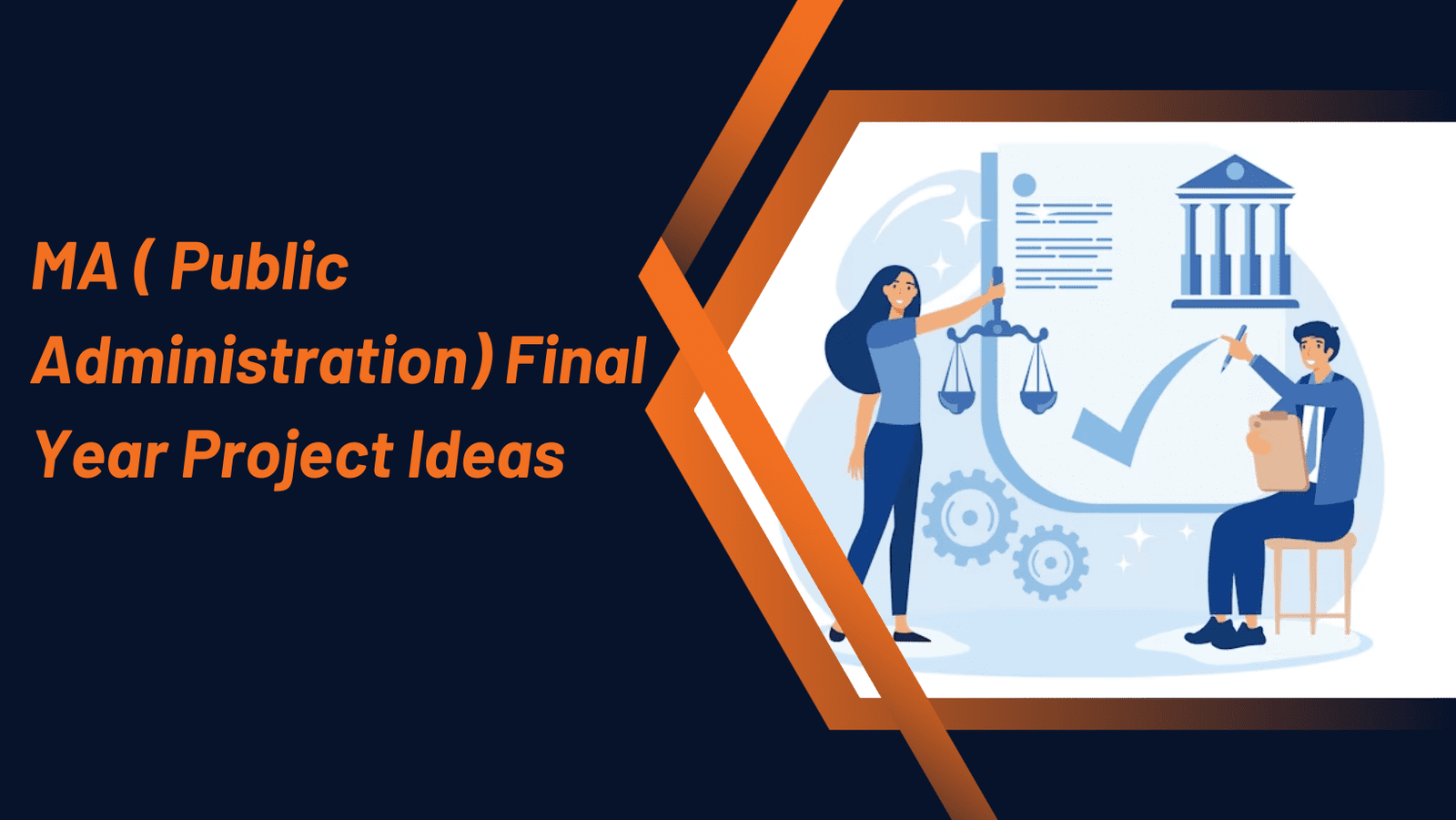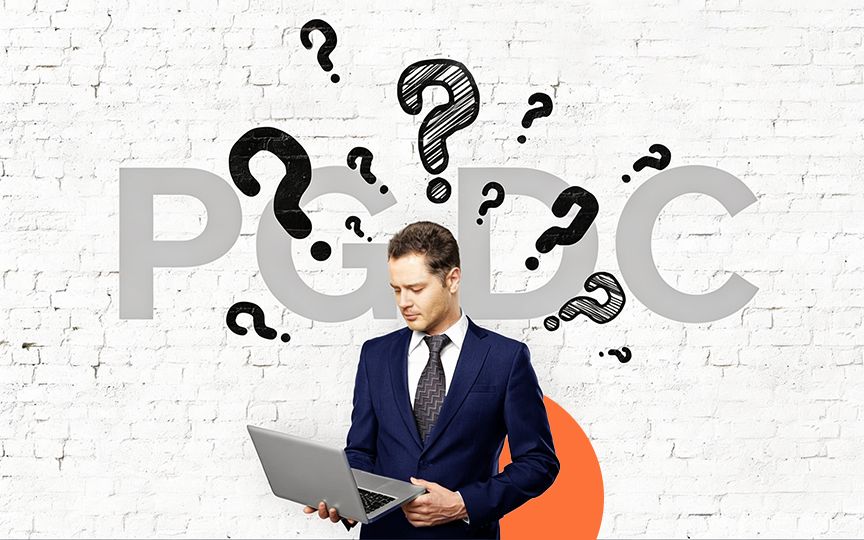Choosing a final-year project idea for your MA in Public Administration can be an exciting opportunity to apply your knowledge and skills to a real-world issue. Here are some project ideas that you can consider:
Policy Analysis and Evaluation: Select a specific public policy or program and conduct an in-depth analysis of its effectiveness. Assess its impact on the target population, cost-effectiveness, and any unintended consequences. Provide recommendations for improvement or modification.
Public Opinion and Surveys: Conduct a survey or focus group study to gather public opinions on a current policy issue. Analyze the data to understand public perceptions and attitudes, and discuss how these insights could inform policymaking.
Local Government Efficiency: Evaluate the efficiency and effectiveness of a local government agency or department. Identify areas where improvements can be made, such as streamlining processes, reducing bureaucracy, or implementing technology solutions.
Environmental Policy Analysis: Examine the environmental policies and practices of a specific region or government entity. Assess their impact on sustainability, environmental protection, and climate change mitigation, and propose policy recommendations.
E-Government Implementation: Investigate the implementation of e-government initiatives in a particular area. Analyze the benefits and challenges of digitizing government services and recommend strategies for enhancing digital governance.
Community Engagement and Participation: Study the levels of citizen engagement and participation in local government decision-making processes. Develop strategies to increase civic engagement and improve the inclusivity of public participation.
Public-Private Partnerships (PPPs): Analyze the effectiveness of PPPs in delivering public services, infrastructure, or development projects. Assess the benefits, risks, and challenges associated with such partnerships and suggest best practices.
Budget Analysis and Fiscal Management: Examine the budgetary process of a government agency or municipality. Evaluate the allocation of funds, revenue sources, and financial sustainability. Provide recommendations for improving fiscal management.
Crisis Management and Disaster Preparedness: Evaluate the emergency response and disaster preparedness plans of a government agency or municipality. Identify areas of improvement in crisis management and propose strategies for enhancing resilience.
Social Equity and Inclusion: Investigate disparities in access to public services or opportunities within a specific community or region. Develop policies and initiatives to promote social equity and inclusion.
Public Health Policy: Analyze public health policies, especially in light of recent global health crises. Examine their effectiveness in protecting public health and propose improvements or reforms.
Ethics and Accountability in Public Administration: Study the ethical standards and accountability mechanisms within a government organization. Propose ways to enhance ethical behavior and transparency in public administration.
Comparative Policy Analysis: Compare the public policies and administration practices of two or more countries or regions. Identify lessons that can be learned from different approaches to similar issues.
Digital Privacy and Data Protection: Investigate the privacy implications of government data collection and surveillance programs. Analyze the legal and ethical aspects of digital privacy and propose reforms.
Public Administration and the Digital Divide: Examine the digital divide’s impact on access to public services and opportunities. Develop strategies to bridge the digital divide and ensure equitable access for all citizens.
When selecting a final-year project idea, consider your interests and the specific areas of public administration that intrigue you the most. Additionally, consult with your professors or advisors for guidance and to ensure that your chosen project aligns with the program’s objectives and requirements.
Performance Measurement and Management: Evaluate the performance measurement systems used in a government agency or organization. Suggest ways to improve the measurement of outcomes and the use of performance data for decision-making.
Urban Planning and Development: Analyze urban planning policies and their impact on urban development, sustainability, and quality of life in a specific city or metropolitan area. Propose urban planning strategies for future growth and development.
Public-Nonprofit Partnerships: Study collaborations between government agencies and nonprofit organizations. Assess their effectiveness in delivering public services and recommend strategies for enhancing these partnerships.
Public Administration in Crisis Situations: Explore the role of public administration in managing and responding to crises such as natural disasters, pandemics, or political instability. Evaluate crisis management strategies and preparedness.
Healthcare Policy and Access: Analyze healthcare policies and their impact on access to healthcare services, especially for vulnerable populations. Propose reforms to improve healthcare equity and affordability.
Immigration and Integration Policies: Examine immigration policies and their effects on immigrant integration and social cohesion. Recommend policies to support the successful integration of immigrants into society.
Public Procurement and Contract Management: Investigate public procurement processes, contract management, and their impact on transparency, cost-efficiency, and accountability. Propose reforms to enhance procurement practices.
Economic Development and Job Creation: Assess economic development policies at the local or regional level. Analyze their effectiveness in creating jobs, reducing poverty, and fostering economic growth.
Education Policy and Equity: Study education policies and their impact on educational equity and student outcomes. Propose strategies to reduce educational disparities and improve access to quality education.
Criminal Justice Reform: Analyze criminal justice policies and practices, including issues such as policing, sentencing, and prison reform. Recommend reforms to promote fairness and reduce recidivism.
Public Administration and Technology Innovation: Investigate the use of emerging technologies (e.g., AI, blockchain) in public administration. Evaluate their potential benefits and risks and propose strategies for responsible adoption.
International Development and Aid Effectiveness: Explore international development projects and foreign aid programs. Assess their impact on the recipient countries and recommend improvements to enhance aid effectiveness.
Social Welfare Programs: Evaluate social welfare programs, such as welfare, housing assistance, or unemployment benefits. Analyze their effectiveness in reducing poverty and improving social outcomes.
Public Diplomacy and International Relations: Examine the role of public administration in shaping a country’s image and diplomatic efforts. Analyze strategies for effective public diplomacy.
Public-Private Collaboration in Infrastructure: Investigate partnerships between governments and private sector companies in developing infrastructure projects (e.g., transportation, energy). Assess their benefits and challenges.
When choosing a final year project topic, be sure to consider your interests, the availability of data and resources, and the relevance of the topic to current issues in public administration. Your project should contribute to the field and demonstrate your ability to apply your knowledge and skills effectively.
Gender Equality and Public Policy: Analyze the gender-specific impacts of public policies and propose measures to promote gender equality in various spheres of public administration.
Citizen Engagement in Policy Co-creation: Explore innovative methods for involving citizens in the co-creation of public policies and assess their impact on policy outcomes and public satisfaction.
Sustainable Development Goals (SDGs) Implementation: Evaluate the progress of your country or a specific region in achieving the United Nations SDGs. Identify gaps and recommend policy changes to accelerate progress.
Ethnic and Racial Diversity in Public Administration: Examine the representation and inclusion of ethnically and racially diverse populations in public administration roles and propose strategies for enhancing diversity and inclusion.
Public Health Emergency Preparedness: Assess the readiness of your local or national government in responding to public health emergencies and pandemics. Propose improvements in preparedness and response plans.
Transparency and Open Government Initiatives: Analyze the effectiveness of open government initiatives, such as open data and transparency portals. Suggest improvements to increase government transparency and accountability.
Public-Private Partnerships for Infrastructure in Developing Countries: Study the role of public-private partnerships in developing infrastructure in low-income countries. Evaluate their impact on economic development and propose best practices.
Crisis Communication and Public Relations: Examine crisis communication strategies employed by government agencies during public crises. Analyze their effectiveness in managing public perceptions and trust.
Rural Development and Access to Services: Investigate policies and programs aimed at improving rural development and access to essential services, such as healthcare, education, and transportation.
Local Government Finance and Revenue Generation: Analyze revenue sources and financial management practices of local governments. Recommend strategies for improving fiscal sustainability at the local level.
Public Administration and Social Media: Study the use of social media by government agencies for communication and citizen engagement. Assess its impact on public perception and policy influence.
Community Policing and Law Enforcement: Evaluate community policing programs and their effectiveness in building trust between law enforcement agencies and communities. Propose strategies for community-oriented policing.
Public Administration in Times of Political Change: Examine the challenges and opportunities faced by public administration during political transitions or regime changes. Analyze strategies for maintaining stability and continuity.
Public Health Promotion Campaigns: Assess public health promotion campaigns and their impact on behavior change and disease prevention. Propose improvements to enhance the effectiveness of health communication.
Economic Recovery and Stimulus Packages: Analyze government responses to economic crises, such as stimulus packages and recovery plans. Evaluate their effectiveness in revitalizing the economy and supporting citizens.
Government Innovation Labs: Explore the concept of government innovation labs (e.g., “GovTech” labs) and their role in fostering innovation in public administration. Assess their impact on service delivery and policy development.
Immigration and Border Security Policies: Examine immigration and border security policies, their enforcement, and their impact on national security and humanitarian concerns. Propose reforms where necessary.
Public Administration and Sustainable Transportation: Evaluate policies and initiatives aimed at promoting sustainable transportation options, such as public transit, cycling, and walking, to reduce congestion and emissions.
Public Administration in Crisis-Ridden Regions: Study the challenges and strategies involved in public administration in regions affected by conflict or political instability. Explore ways to rebuild and strengthen governance in such areas.
Innovations in Public Service Delivery: Investigate innovative approaches to delivering public services, such as online service portals, mobile apps, or one-stop service centers. Analyze their impact on efficiency and user satisfaction.
When choosing your final year project topic, make sure to consider your interests, the availability of data and resources, and the potential for your research to contribute to the field of public administration or address real-world challenges.







